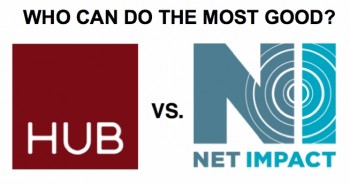Are you sad that the World Cup is over?
Well, last Friday, July 22nd the SF professional chapter of Net Impact and the Bay Area chapter of the HUB “kicked” off a very different type of competition to see which one of these social entrepreneur networks does the most good.
It’s the first competition of its sort in which members ‘check-in’ their good deeds online and get awarded points. At the end of a month, the membership with the most collective points will win the cup.
Are you enjoying this article? Read more like this, plus SSIR's full archive of content, when you subscribe.
Of course, the competition is more friend than foe. The Net Impact and HUB leadership care less about winning the competition than giving their members (900 vs 550, respectively) an engaging way to get to know each other. Checking in good actions is the grease in the wheel of this online social “action” networking platform, powered by Blitz Bazaar (full disclosure: I am the founder of Blitz Bazaar). The members can mingle online and see all the uplifting things everyone else is doing.
The bigger question this competition brings up is the effectiveness of game mechanics to engage members in voluntarism. Can it improve the performance of volunteer-based programs and, if so, can your organization, business, church, university, or school make use of it? Lots of tools like Blitz Bazaar are emerging in every people-driven industry and the social sector is a laggard to adopt them.
Game mechanics is all-the-buzz these days here in Silicon Valley as every scrappy start-up is trying to incorporate peer-peer competition, points, badges and rewards into their games, websites and mobile apps, hoping to be the next Farmville (by Zynga). Having teams face-off against each other is one great way to incentivize people to do get involved, and there are many others.
In my experience, program officers in the social sector and corporate volunteer programs tend to fall into three camps:
- “This stuff is awesome; bring it on. I can use all the help I can get to motivate people to volunteer.”
- “No way. Volunteering is altruistic and shouldn’t be tainted by external motivations.”
- “Interesting. When I see everybody using it, I’ll have an easier time adopting it.”
Apparently the verdict is still out on game mechanics for voluntarism. I sometimes hear people commenting that it’s a fad that will pass or that it’s nice for video games and corporate loyalty programs but not for social work. My response is the opposite; game mechanics is not new at all, even in the social sector. The Boy Scouts have had badges for decades. Schools use a grading system partially to measure success but partly to motivate students, and teachers definitely often use a star system to reward good behavior and a strike system to punish bad behavior. These are all examples of game mechanics in action. What’s new is the medium. The social web is very new and so it’s now the Wild West for these new tools, but they will mature and volunteer programs will adopt them to enhance their programs.
Do you agree?
Support SSIR’s coverage of cross-sector solutions to global challenges.
Help us further the reach of innovative ideas. Donate today.
Read more stories by Lloyd Nimetz.


